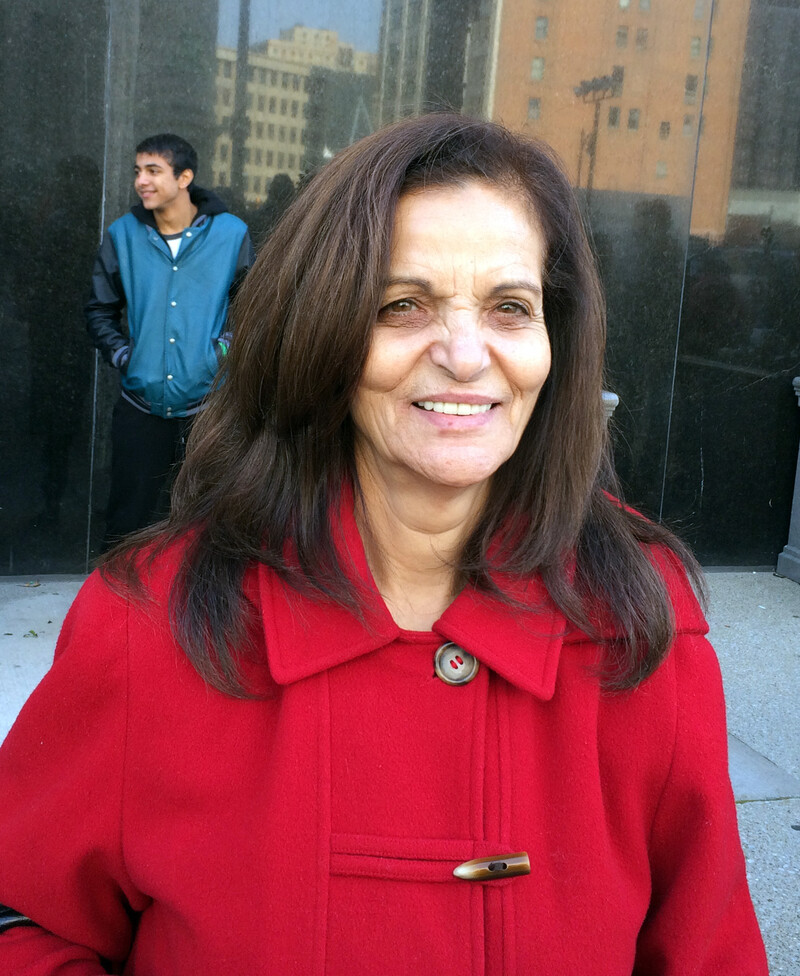Rights and Accountability 15 October 2015

Rasmea Odeh
On Wednesday morning, Rasmea Odeh’s defense team argued before an appeal court that their client was denied her right to a fair trial.
“She was precluded from presenting her complete defense … when the trial judge precluded her expert witness testifying about her diagnosis of have chronic post-traumatic stress disorder,” Michael Deutsch, Odeh’s lead attorney, said in opening remarks.
Last November, the Palestinian American community leader was found guilty of fraudulently obtaining US citizenship by failing to disclose on immigration and naturalization documents her 1969 conviction in an Israeli military court.
The defense argues that her mental condition prevented her from recalling her Israeli conviction at the time she filled out her applications. But the trial judge did not allow Mary Fabri, an expert witness on torture who examined Odeh, to testify at trial.
Odeh’s defense and government prosecutors each got 15 minutes to argue their cases before a three-judge panel in the Sixth Circuit Court of Appeals in Cincinnati, Ohio.
Most of the time was taken up by spirited back and forth as the judges – Alice Batchelder, Karen Moore and John Rogers – asked the lawyers probing questions.
An audio recording of the hearing has been published by the court.
“I thought it went very well, better than I expected,” Deutsch told The Electronic Intifada. “I thought the judges took it seriously and weren’t hostile to the issues.”
“I think part of it has to do with the courtroom being filled with her supporters,” Deutsch added.
More than 100 of Odeh’s supporters travelled from Chicago and other cities to attend the hearing.
“Good day in court”
The judges appeared to challenge the prosecution’s argument that Odeh does not have a right to present an expert witness.
“I just don’t understand,” Judge Roberts told Assistant US Attorney Jonathan Tukel, who led the prosecution against Odeh.
“Her false statement was ‘no’ to a question. If an expert testimony could say her mind interacting with that question in that language on that date didn’t register the facts that would lead her to say ‘yes,’ then that would go to whether or not she knew she was lying,” Judge Roberts said.
William A. Jacobson, a law professor at Cornell University who has often expressed hardline anti-Palestinian views and who runs the blog Legal Insurrection, wrote, “If all you listened to was the audio, it seems like Rasmea had a good day in court.”
But Deutsch cautioned against reading too much into the hearing.
“You never know what the outcome will be,” he said. “You can’t always tell the result by the questions they [judges] pose. Sometimes they are just being devil’s advocate.”
While Odeh’s appeal brief also argues against the prosecution’s inclusion of Israeli military court documents at trial, Wednesday’s hearing focused exclusively on Odeh’s right to call an expert witness.
Deutsch estimates the court will take between one to three months to issue a decision.
In the meantime, Odeh remains “out of jail and continuing to do her work which is so important.”
Odeh is associate director of the Arab American Action Network in Chicago, where she has founded a number of programs for immigrant woman.
“Every day she’s out of prison it’s a victory for her and her community,” Deutsch said.






Comments
Freedom for Rasmea Odeh
Permalink tom hall replied on
Rasmea Odeh was comprehensively prevented from offering a defense to the charges. She was not allowed to present expert testimony as to her psychological condition at the time she applied to US Immigration. She was not allowed to introduce testimony that she was tortured and raped by Israeli jailers prior to being convicted. The nature of Israeli military courts, which deny basic rights to defendants and have a 99% conviction rate, was not queried. In fact, the entire trial in the US simply reproduced the Israeli state's verdict and upheld that state in its established pattern of grossly criminal conduct in such "anti-terrorism" cases. If ever a defendant was railroaded, Rasmea Odeh qualifies. I hope that the presence of her supporters has some influence on the judges' deliberations. The facts themselves speak clearly of a perversion of justice. This is a blatantly political case, and it's part of a larger campaign to silence and intimidate popular dissent. Hopefully, the appeal's merits will be accepted by the panel and Rasmea Odeh set free. After such a travesty, she deserves nothing less.
Was the Israeli military conviction void?
Permalink Paul E. Merrell, J.D replied on
I'm guessing that the issue was never raised, but it seems to this retired lawyer that the conviction by the Israel military was void for lack of lawful jurisdiction, hence the defendant was under no obligation to report it.
Under the Fourth Geneva Convention, Israel was required to withdraw from all occupied territory immediately upon cessation of hostilities in its 1967 Six-Day War. Israel committed war crimes and crimes against humanity by failing to do so, hence its military tribunal had no lawful authority to try her for criminal acts.
Moreover, even were the refusal to withdraw issue ignored, the Convention also requires that the existing institutions including courts and laws within occupied territory be maintained. Only the Jordanian government institutions within Occupied Palestine had jurisdiction to try the defendant for crimes. An occupying power has only a limited police power to detain within occupied foreign territory; it cannot lawfully supplant that territory's system of criminal justice or substitute its own laws.
U.S. law is that a judgment obtained from a court or tribunal that lacked lawful jurisdiction is void and a nullity.